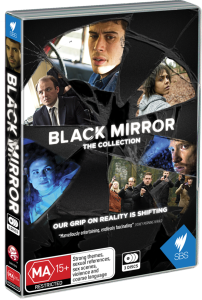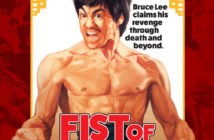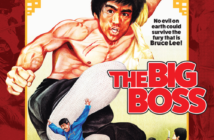There’ something of a kind of crotchety senior citizen “back in my day’ feel about Black Mirror and its dystopian view of society’ all out embrace of technology. It’s not by any means hidden, nor is it to its detriment, but you do get the sense that the makers are aghast at how unquestioning we all are about each new technological wonder that will inevitably make our lives so much easier. Because that’s what we want right? An easy life?
It’s the brainchild of Guardian columnist and television writer and personality Charlie Brooker (Dead Set/ Nathan Barley), and it’s dark speculative satire, in the main taking concerning current sociological trends to their logical, or perhaps illogical conclusions. There’ also a real pessimistic feel to Black Mirror, a certain frustration about the passivity of the populace as their freedoms, privacy and sense of self are effortlessly eroded by governments and corporations’ -usually with stupefied consent.
People have suggested that it’s an update on The Twilight Zone, and while there’ no denying that its concepts can get similarly weird, Black Mirror is much less about last minute twists and less escapist, being more concerned with explicit social critique.
The first episode The National Anthem is the best television this writer saw all year, possibly the most gripping, terrifying morbid and addictive piece of black humour ever to screen on television. It nails contemporary politics, contemporary media, juvenile humour and the thriller genre in one foul swoop. This is the Prime Minister and the pig episode and it is remarkable, tapping into the sadism of the populace and their willingness or perhaps self-determined right to stand in judgement over our public figures. Television has never been this far out on the edge. The writing, performances and direction is flawless in this episode. It packs a punch.

Whilst the remainder of Black Mirror (that’s four additional episodes across two separate series) can’ ever hope to live up to the impact of The National Anthem, each subsequent episode does open up some interesting dilemmas. They delve into our addiction to smart technology, our curious desire to document our lives online, our ability to access everything about ourselves and our partners at the touch of a button, the immense power of the brand and retribution in an overly surveiled world. Along the way though they engage with us in a very human way, posing numerous ethical and philosophical questions, most notably about the nature of love in this brave new world. There’ romance here, but it’s bleak and unsatisfying, impeded and distorted by the integration of technology into our lives. It’s also repeatedly funny, but it’s a dark humour, often mined for absurdity, a cynical caustic humour borne out of humanities thirst for the lowest common denominator. Black Mirror’ characters feel like pawns in a grander game. They’re difficult to empathise with for more than a fleeting moment, sure they suffer pain, embarrassment, joy, but then they repeatedly put personal desires ahead of principle. How could you ever maintain sympathy for selfish people like that?
There’ no doubt that Black Mirror achieves its aim. Television is usually an instrument of passivity, designed to nullify its audience via a mix of escapism and material envy. Black Mirror does the opposite, it will have you questioning everything; from your smart phone to your twitter feed nothing will ever be the same again. And the fact that Black Mirror utilises the very medium it lambasts to deliver its message? Well that’s just irony. It’s layer upon layer upon layer and it knows it.
* Note that the second episode of the first series isn’ included in this collection due to copyright issues with the music.




